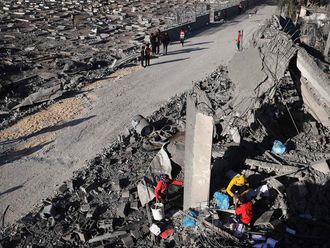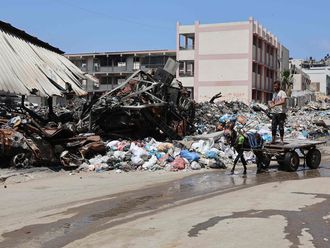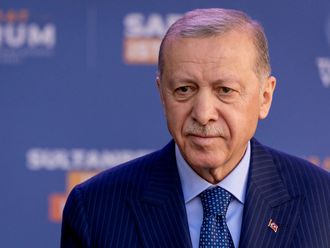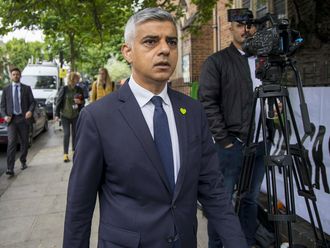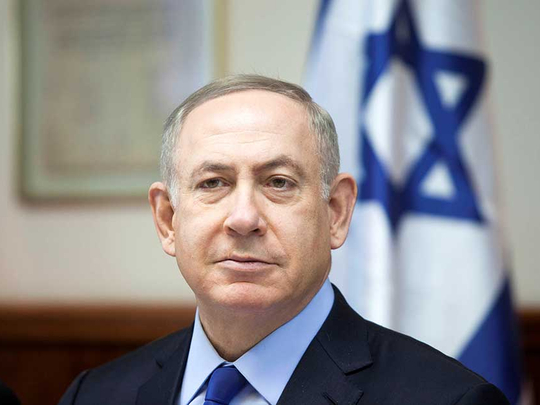
Occupied Jerusalem: Israeli Prime Minister Benjamin Netanyahu lashed out Sunday at what he called the “old-world bias against Israel,” attacking President Barack Obama and the United Nations over a resolution that criticised Israel’s illegal colony activity in the occupied West Bank and occupied East Jerusalem.
Netanyahu compared Obama with former US president Jimmy Carter, whom he called hostile to Israel and the last president to break with US commitments to support the state. Those who try to harm Israel will pay a high price, the prime minister said, adding that Israel would fight to cancel Friday’s resolution.
“The resolution is distorted. It states that the Jewish quarter and the Western Wall are occupied, which is absurd,” said Netanyahu, referring to holy Jewish sites that sit within the Old City in Israeli-occupied East Jerusalem.
Netanyahu balanced his harsh words about Obama with his most explicit statement yet in enthusiastic anticipation of Obama’s successor, Donald Trump.
Israeli leaders on Saturday seemed to be counting down the days to Trump’s Jan. 20 inauguration, hoping he will offer a more sympathetic approach to Israel and bring an end to what one senior minister called Obama’s support for “Palestinian intransigence, incitement, violence and terror.”
Later Saturday, the US president-elect tweeted that the United Nations action “will make it much harder to negotiate peace. Too bad, but we will get it done anyway!”
The resolution, which was brought for a vote Friday in the UN Security Council, declared that colonies built on land Israel has occupied since the 1967 Arab-Israeli war have “no legal validity” and are a threat to the possibility of creating two states - one for Israelis and one for Palestinians.
The 15-member council passed the resolution 14 to 0, with the United States, in a break from standard practice, abstaining rather than vetoing. It was the first resolution adopted by the council on Israel and the Palestinians in nearly eight years.
The vote also sparked strong reactions among pro-Israeli US lawmakers. On Saturday, Sen. Lindsey Graham, R-S.C., told CNN he will ask Congress to rescind funding for the United Nations unless it repeals the resolution on colonies.
“If you can’t show the American people that international organisations can be more responsible, there is going to be a break,” Graham said. “I can’t support funding a body that singles out the only democracy in the Middle East who shares our values.”
In a statement after the vote, Netanyahu said the Obama administration had “not only failed to protect Israel against this gang-up at the UN, it has colluded with it behind the scenes.”
He called the resolution shameful and said Israel would not abide by its terms.
For the first time since the US election, Netanyahu stated clearly that he looked forward to working with Trump, “to negate the harmful effects of this absurd resolution.”
Netanyahu and his ministers have generally refrained from making public statements about Trump, but subtle words and gestures have suggested that the Israeli leadership is buoyed by the new administration.
Roughly 400,000 Jewish colonists live on 125 colonies and 100 outposts in the Israeli-occupied West Bank. Over the past six months, Israel has announced plans to add hundreds of units to existing colonies in the occupied West Bank and occupied East Jerusalem, each time drawing rebuke from the White House.
More recently, right-wing voices in Netanyahu’s government have pushed legislation to legalise settlements built on privately owned Palestinian land, a step also frowned upon by the Obama administration.
Trump, on the other hand, has indicated he might bring a fresh approach to the Israeli-Palestinian conflict. Last week, he nominated a close adviser and outspoken supporter of Israel’s settlements, New York lawyer David Friedman, as ambassador to Israel. And on Thursday, he tweeted that “The resolution being considered . . . should be vetoed.”
The potential change in direction might explain why there was such urgency to bring the resolution to a vote Friday, as well as the US decision not to veto it.
A White House official, speaking on condition of anonymity about the sensitive internal discussions, said the Security Council vote was preceded by months of back-and-forth discussions about numerous draft resolutions in circulation.
The official said the White House would not back any measure that delegitimised Israel or imposed a solution on the two parties, and would veto any resolution that omitted mention of ‘Palestinian incitement to violence and terrorism’.
Palestinian officials termed the resolution a ‘victory’.
Saeb Erekat, a former peace negotiator and the No. 2 in the Palestine Liberation Organisation, said the vote was a “clear and unanimous message” to Netanyahu that “your policies will not achieve peace and security for Israel or the region.”


